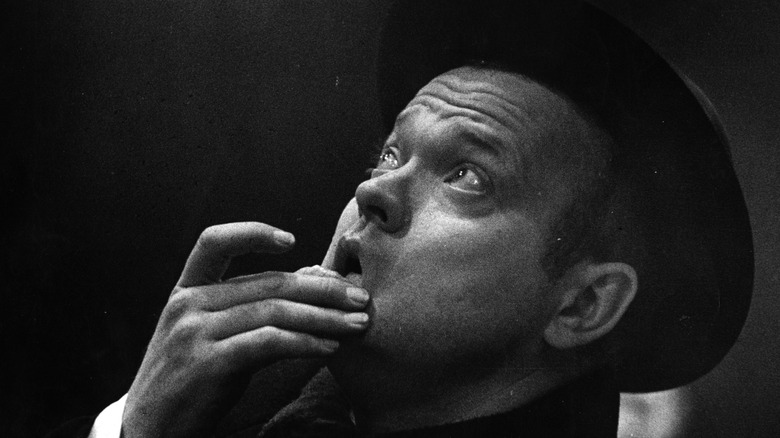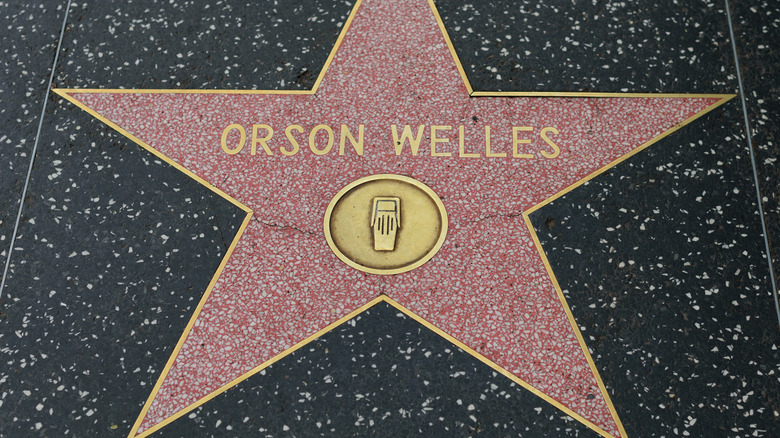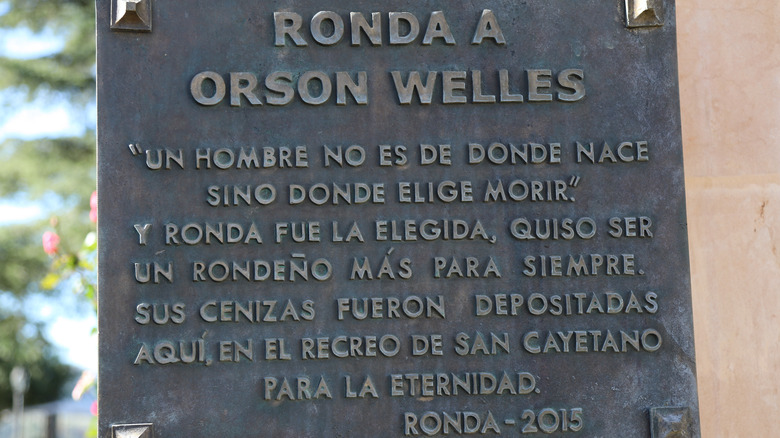Orson Welles' Grave Explains Why His Ashes Are In Spain
From a young age, it was clear that Orson Welles had a range of remarkable talents. The boy Welles was a skilled writer and performer, and could play musical instruments. It seemed to just be a matter of where his career would take him as he grew up, as he was clearly a young man to watch.
Per Britannica, Welles was born in Kenosha, Wisconsin in May 1915 and journeyed to Dublin, Ireland in 1931. Though he was only in his mid-teens, Welles found acting and directing work at the Abbey Theater, getting his first big taste of the industry and media that would come to define his fruitful life. By the end of the decade, radio performances had become another feather in his particularly feathery cap.
He is perhaps best known for his radio adaptation of H.G. Wells' "The War of the Worlds." The broadcast, National Endowment For The Humanities reports, took place in October 1938. By adjusting Wells' work, giving it a contemporary New Jersey setting, the outlet explains, Orson Welles convinced some listeners that the martian attack was really happening live. It was presented more as a breaking news story than the intriguing slice of science fiction it really was.
The iconic actor and director died in Los Angeles in October 1985 at the age of 70, Britannica reports. His final resting place is in Spain, however, and a plaque explains why, according to Hotel Alavera De Los Baños Ronda.
The well-traveled Orson Welles
Welles' finest hour (depending on your opinion of the whole affair) may well have been that notorious "The War of the Worlds" transmission. After all, he was a storyteller and entertainer, and he certainly held people spellbound with that one. As History reports, one spooked listener interrupted a church service in Indianapolis to scream at the assembled people, "New York has been destroyed! It's the end of the world! Go home and prepare to die!"
Drama was what Welles seemed to enjoy most. His most acclaimed movie (one of the most acclaimed movies of all time, in fact), was 1941's "Citizen Kane," even though it was considered a failure at the time. He didn't appear to understand the subsequent renown he received for making it, though. Speaking on "The Dick Cavett Show" about the business of making movies, Welles said, "It isn't much harder than taking home movies. It's just about three points harder."
What, then, was his true passion? Traveling the world, per Britannica, was a huge part of his life, as it took him everywhere from his native United States to the theaters of London and to Spain, the latter of which was surely one of his favorite places of all. The Associated Press reported on May 8, 1987 that Welles' ashes had been brought to Ronda, Spain and lowered into the well of a picturesque farm as per his wishes. The choice, the wording on his memorial seems to reveal, meant everything to him.
Where Orson Welles truly belonged
As the Associated Press reports, the urn containing Welles' ashes were placed in their beautiful eternal home by Antonio Ordonez, a bullfighter whose family owns the land. Ordonez was a close companion of the famed director, whose daughter Beatrice was in attendance at the solemn occasion.
As visitors have recorded on TripAdvisor, there's a memorial to Welles in Ronda, complete with a stone bust of him and a plaque with an inscription. The words read, "Un hombre no es de donde nace sino donde elige morir." This translates, per the Hotel Alavera De Los Baños Ronda, to "A man does not belong to the place he was born in, but to the place he chooses to die."
The American movie icon's work took him far from home, both before and after he became a force to be reckoned with in the media. It's a beautiful, modest choice of a final resting place, and one that seems to prove this touching statement: As high-profile as he was, Welles seemed to fall in love with this quiet, low-key corner of Spain. He died in Los Angeles, per Britannica, but this was where he belonged.


